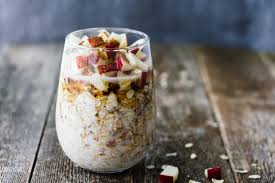Build a Better Breakfast
Is your semester filled with early morning classes where all you have time to do is wake up and run out the door? We feel you! It can be tricky to make time for a healthy breakfast when you’re in a rush. But with a just a bit of planning, you can make balanced breakfasts a breeze.

Eating breakfast actually has a lot of evidence behind why it’s a good idea! Research suggests that consuming breakfast helps our attention, executive function, and memory.1 In other words, eating breakfast may help with keeping up concentration during those tricky classes! Research also shows that adults who consistently consume breakfast are more likely to have a lower body mass index, and a lower degree of weight gained over time.2 A good strategy when planning your breakfast is to include foods that will release energy more slowly and steadily. This helps us to feel fuller longer after breakfast, and to prevent sugar crashes that can leave us feeling tired later on. To build a filling breakfast, follow these tips:
- Include a source of protein. Protein is composed of amino acids that act as building blocks for our muscles, and protein does an excellent job at helping to keep us satiated.3 Good protein sources include 2 eggs (12 grams protein), ¾ cup yogurt (7 grams protein), 1 cup milk (8 grams protein) and 2 tablespoons peanut butter (7 grams protein).4
- Choose whole grains over refined grains. Whole grains are grains which have undergone the least amount of processing, and that retain all their fiber, vitamins such as vitamin B and E, minerals and healthy fats. In particular, the fiber in whole grains helps with satiety. For the whole story on whole grains, check out our previous blog here! https://dining.carleton.ca/2018/whole-story-whole-grains/ Try whole grains such as 1 piece of wholegrain toast (7 grams fiber), ¾ cup cooked oatmeal (3 grams fiber) or 1 whole grain English muffin (4 grams fiber).4
- Aim to have foods from 2-3 food groups in your breakfast. For more information on food groups, check out https://www.canada.ca/en/health-canada/services/food-nutrition/canada-food-guide/choosing-foods.html Having more than one food group ensures that you are getting a larger, more balanced variety of nutrients at breakfast. Try out the following ideas!
- Poached eggs on wholegrain toast
- Fresh fruit with yogurt and granola
- Wholegrain cereal with milk
- Scrambled tofu and sautéed peppers on a wholegrain wrap
- Oatmeal with berries and chia seeds

Even though your brain may want get up early to make breakfast, your heart might be telling you to sleep in for just one more minute. Don’t fear! There are many easy make-ahead breakfast ideas that let you get every last wink of sleep. Try overnight oats! Overnight oats means assembling your oatmeal ingredients the night before, and simply throwing them in the fridge. The oats will absorb the liquid overnight, making the oatmeal ready to go by morning. We love the article by Cookie + Kate about how to make the perfect overnights oats: https://cookieandkate.com/2017/overnight-oats-recipe/
Wholegrain muffins and trailmix are both easy make-ahead breakfast options, and pair well with a glass of milk and a piece of fruit. Or, try out this easy recipe for grab-and-go egg muffins from Café Delights:5
Ingredients
- 12 large eggs
- 2 tablespoons finely chopped white onion
- 1/4 cup fresh spinach, roughly chopped
- 8 grape or cherry tomatoes, halved
- 1/4 cup shredded mozzarella cheese
- Salt and pepper, to taste
Instructions
- Preheat oven to 350°F | 180°C. Lightly spray a 12-cup muffin tin with nonstick oil spray.
- In a large bowl, whisk together eggs and onion. Season with salt and pepper, to taste.Add egg mixture halfway up into each tin of a greased muffin tin.
- Divide the three topping combinations into 4 muffin cups each, and bake for 20 minutes.
- Serve or store in an airtight container in the refrigerator for up to 4 days and reheat when ready to serve.

We hope we’ve inspired you to enjoy breakfast! Until next week Ravens!
References
- The Effects of Breakfast and Breakfast Composition on Cognition in Children and Adolescents: A Systematic Review (2016) https://academic.oup.com/advances/article/7/3/590S/4558064
- Mesas AE, Muñoz-Pareja M, López-García E, Rodríguez-Artalejo F. Selected eating behaviours and excess body weight: a systematic review. Obes Rev. 2011;13(2):106-35. Abstract available from: https://www.ncbi.nlm.nih.gov/pubmed/21955734
- Dietary Protein – its role in satiety, energetics, weight loss and health. (2012) https://www.cambridge.org/core/journals/british-journal-of-nutrition/article/dietary-protein-its-role-in-satiety-energetics-weight-loss-and-health/CCA49F7254E34FF25FD08A78A05DECD7/core-reader
- Canadian Nutrient File (2018) https://food-nutrition.canada.ca/cnf-fce/
- Breakfast Egg Muffins 3 Ways (2018) https://cafedelites.com/breakfast-egg-muffins-3-ways/